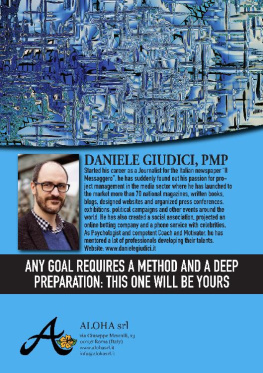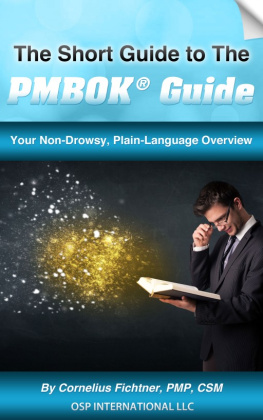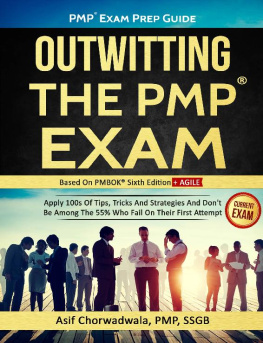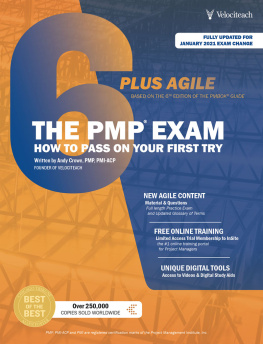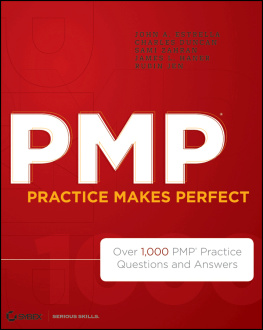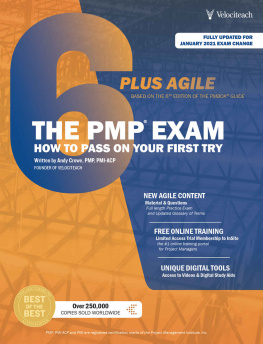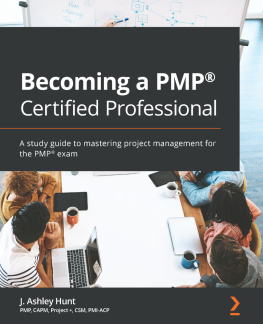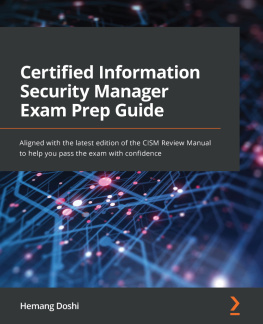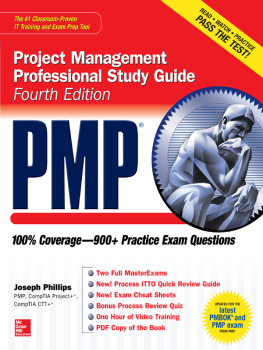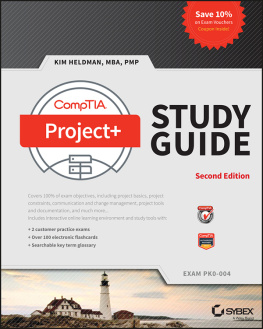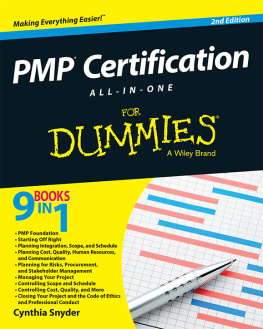Daniele Giudici, PMP
PMP EXAM
no problem!
PMBOK - Sixth Edition
Aloha srl
To my beloved wife Roberta Ginevra,
my best "project" in my life
INTRODUCTION
First of all, let me congratulate you for your wish to become a Professional Project Manager through the PMP certification. It will be a big step forward in your career and once youll have passed the exam, and youll have received the certificate from PMI, be prepared to see your career boosting. Later, Ill show you why PMP is important for who already works in this field and also for ones that want to jump into this amazing world, but now in these few pages, I want to show you why my book is the best choice for you.
By the way, please let me say that I'm really proud of what the previous edition of my book ( PMP exam, no problem! based on PMbok's fifth edition) has given to my readers. I have received a lot of emails and messages from colleagues that found my manual extremely useful as a complementary book besides the PMbok and other preparation resources. I'm happy about that because I wrote this book starting from my experience as a student: too many information to learn, a different project management approach than my own, a difficult test with a lot of questions to answer in a short time. At the same time, I know that someone prefers books with images, draws, colors, or video, but in bookstore or online there are already them, and I wanted to fill an empty space with something that didn't exist before. Here you can find every information that is important to know to pass this exam or, in general, to improve your project management skills, everything is in sequence and easy to find and to comprehend.
I really hope that you'll be able to be the next one to pass the exam. Good luck with it!
The right way of thinking
Getting the PMP is not as easy as you can think, even if youre an experienced project manager in your company. Its not easy because of tons of information, formulas, structures, definitions to memorize, but more important is the way of thinking that is behind the PMbok (the reference book written by the PMI). As you can see, the Project Management world has changed many times since its first years, there is the old school of thoughts that think the traditional method (Waterfall) is still the best, and the new one (with Agile methodologies such as Scrum, Lean, Kanban, and so on) that comes from the IT industry, but now is spreading in all other sectors. Beside this, every single person that leads a team and is responsible for a project works with its own method, procedures, and practices. This personal know-how works, of course, and that's why every single company in the world produces its deliverables even though its project managers don't know anything about the above-mentioned methods.
Anyway, the PMIs work has always been to provide a sort of academic organization of the Project Management theory, standardizing strategies, organizations, procedures, to give a universally recognized way of managing projects. This is the first important aspect to keep in mind: the certification is about your knowledge in project management as the PMI intends the project management, not as your ideas of it.
My experience
Thats exactly what I experienced when I approached the PMbok for the first time. I decided to get the PMP certification when I was 39, and I had already worked as project manager in an Italian media company for more than 20 years. I had led teams up to 30 people (journalists, media partners, advertisers, experts, and so on), I had launched on the market tens of new magazines and rebranded old products that were unprofitable, managing budget of millions of euros, and I can proudly say that I have always succeeded in my goals even if I had never heard about tools such as EVM, CPM or simply a backlog. So, when I bought the PMbok I found a new world. I had my own method, learned working side by side with very good masters, and perfected it years after years with a lot of practice. I have the talent for this job, it's always been my passion, and since my adolescence, my hobby has been to create games, magazines (at school, with my friends, and so on) and achieving my goals, so at 39 I presumed I had the right experience for getting this certificate. Well, I was right, but PMbok is organized in a different way, it has been ideated thinking to a Project Manager that works in a multinational company, a very big company, and you must keep this in mind when you will answer to every single question youll find in the exam. If you work in a small company (I mean, even one with tens of employees), you must switch your mind as if you're the project manager in a company with thousands of workers.
Anyway, I studied the PMbok, I attended different courses, I watched videos, and I read a lot of related books that should help in preparing the exam (you can find a list at the end of this book), and what I found is that the method I used daily in my life was quite the same described in the PMbok, but with other words, other tools, other methods.
Open your mind and put your knowledge aside
So, if you had never worked in a PMP environment, youd probably have to reshape your know-how. This aspect can be easy for someone, but extremely difficult for others: youll find questions that are simple for you and youd easily manage those situations in your office, but your answer will be wrong. You could find yourself answering, of course, its the answer B because its exactly what happened to me two weeks ago and I successfully solved this problem in this way. Then you check the answer and the right one is A. Your first thought will be what? Its not the right way!. So, be calm, try to get the best from your experience, and think how you should act if you were a project manager in an international company with standardized procedures or tools in a PMP way. I know, it could be difficult, it was difficult for me, the first times I answered a few example questions in an exam simulation I was a disaster because I approached the exercises with my experience, but PMI wants you to think differently, in a standardized way, more scientifically. PMI has standardized this job and you must answer in its way, not in yours. So, keep your mind open, dont fight with the book, just read it, study it and do tons of exercise.
The more exercises you try and the more chance to pass you have. I told you, its not easy, but its not impossible.
Time and quantity of studying
A common question you can find on the web is: "How long do I have to study for passing the exam?". The answer is very difficult because it depends on different factors:
- Your experience as a PM (Project manager);
- Time available for studying;
- Quantity of practice;
- Your mind speed.
I have already written about the first aspect (consider it, but think as a PMP Project Manager), and only yourself know how hard you want to study in terms of time for memorizing the information (the seventh chapter here explains a memorization technique) and for practicing exercises, but here I want to focus on the fourth point. Its important you know the PMP exam is composed of 200 questions, some easy and some complicated , and you have only 4 hours to answer to all of them. A lot of time? Well, you have 1,2 minute to answer each question, and in this minute you must read the question, think about it, decide the right answer and then check it. If its a simple question, ok, but if you find a question with a double negation, a trick one, or a question with a calculation (such as EVM or a CP) one minute is really not enough. Remind that most of the questions are about situations ("What would you do if...") and not just notions ("How many knowledge areas?"): you must choose the best answer in a specific scene so you have to imagine yourself in that picture: "how could I act in this scenario as a PMP (and not as the PM I usually am)?". So, its not that automatic, every question requires your full attention. Prepare yourself for being concentrate for 4 hours, wearing only a couple of earplugs to avoid any distraction, and be ready to feel stressful for the whole time. Then, of course, everything is subjective and probably youll approach the exam as a stroll in the park during a sunny spring day, but its important that you know this aspect. An useful advice could be to select 400 fake questions randomly from the various sources on the web, then find 4 hours in which nobody will disturb you, and go. Use only a paper, a pencil and a clock with an alarm. Test yourself in a similar environment before the exam.
Next page
